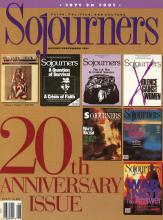Any remaining doubts about the conservative political goals of the current Southern Baptist Convention (SBC) leadership should have evaporated like dew on a hot summer morning after the June meeting of the SBC in Atlanta. With a giant stars-and-stripes backdrop on the speakers' stage, smaller flags fluttering through the crowd of 25,000, and speeches by George Bush and Oliver North, an outside observer might have mistaken the event for a convention by another name.
Despite repeated claims that their motivations for purging the convention of "liberals" over the past 12 years are purely religious (through forced resignations and firings), SBC leaders have shown no hesitancy to step outside their own lines when political ends are involved. As an example, consider that although fundamentalists unequivocally renounce speaking in tongues and ecumenism (among a myriad of other things), North, a charismatic, non-Southern Baptist, military man, was the speaker at the pastors' conference of this year's convention.
But for the first time since 1979, when the fundamentalists gained control of the convention, this year's meeting was marked by the virtual absence of controversy. Morris Chapman was re-elected president without contest. And although the vote was surprisingly close, SBC fundamentalists prevailed in completely defunding the Baptist Joint Committee on Public Affairs (BJCPA). The Washington, DC-based BJCPA, a highly respected champion of church-state separation, has refused to act as a lobbying agency for the conservative agenda of the new SBC leadership.
This year's lack of controversy was due primarily to the fact that Baptist non-fundamentalists, or "moderates," have largely decided to end their battle with SBC fundamentalists. Just a few weeks prior to this year's convention, 6,000 moderates met in Atlanta and formed the Cooperative Baptist Fellowship (CBF).
Read the Full Article
